
THE FLIES:
Themi Adams (bass)
Ronnie Burns (vocals, guitar) 1964-65
Peter Nicol (guitar, vocals) 1965-66
John Thomas (guitar)
Hank Wallis (drums)
| MILESAGO: Australasian Music & Popular Culture 1964-1975 | Groups & Solo Artists |
RONNIE BURNS (including The Flies)
Melbourne 1964 - present

|
THE FLIES: |
History
Ronnie Burns has always been an honest, likeable, no-frills, boy-next-door Aussie pop star and entertainer – nothing more, nothing less. He began his musical career as a folk singer in Melbourne before catching the ‘Beatle bug’ in 1964, whereapon he became a founding member of The Flies.
The Flies
Alongside Bobby & Laurie Melbourne combo The Flies were (as their insect name indicates) one of the very first bands in Melbourne to catch on to the new 'beat' style and gained attention as "Victoria’s top Beatle-alikes", even down to their matching suits and very long mop-top hair. A shambolic, noisy bunch at the best of times, the quartet achieved considerable popularity on the booming Melbourne dance circuit, with a repertoire of Brit-vasion standards from the catalogues of The Searchers, The Hollies and Herman’s Hermits and others, along with some of the ‘bluesier’, more raucous Beatles numbers like "When I Get Home" and "You Can’t Do That".The Flies toured interstate during late 1964 and early 1965 under the guidance of manager Gary Spry, and had one of their brightest moments supporting The Rolling Stones on their first Australian tour in January 1965. But when Spry heard the real "Aussie Beatle-alikes", The Twilights at the Oxford Club in Adelaide, he dropped his former clients like the proverbial hot brick and took over The Twilights instead ... a good move for Spry & the ‘Lights, but not such a good omen for The Flies. Ronnie quit the band in August 1965 to go solo, to be replaced by Peter Nicol. The Flies lasted only a few months longer and are now sadly relegated to being a footnote in the story of Burns’ solo career.
Solo career
Another twist of fate plays a prominent part in the Burns story, because Ronnie was a childhood friend of future music journalist, pop guru and producer Ian "Molly" Meldrum. Some of the hilarious and outrageous stories Ronnie can tell, including the classic tale about him and Meldrum being ejected from The Beatles’ 1964 Festival Hall concert, have become the stuff of OzRock folklore, and there’s sure to be a good book lurking in the wings!
Ronnie's clean-cut image, appealing, boyish, dimpled good looks and impeccable sartorial presentation immediately made him a favoured TV and pin-up star when he launched his solo career under the aegis of leading Melbourne impresario Jeff Joseph. In his 2002 This Is Your Life profile, Russell Morris revealed that seeing Ronnie's solo success first-hand was the direct impetus for him to leave Somebody's Image and go solo himself. Ronnie could often be seen on pop TV shows including The Go!! Show and Uptight, as well as in the pages and on the covers of Everybody’sand Go-Set magazines -– and his Go-Set 'cred' was certainly not hurt by his close friendship with Molly!
While Ronnie perhaps never quite inspired heights of frantic fan adulation as, say, Normie Rowe, he was extremely popular, and enjoyed a series of strong chart hits, many written and/or produced by the cream of Aussie pop composers and backed by some of our top musicians. And he was voted Australia’s most popular male performer, or "King Of Pop", on more than one occasion.
Ronnie's was consistently successful in his hometown of Melbourne, and his popularity gradually spread thanks to regular TV and concert appearances. He signed a solo recording contract with the Spin label, and his debut solo single for them was "Very Last Day" / "Let It Be Me". The A-side, "Very Last Day" was written by Paul Stookey and Peter Yarrow, of Peter Paul & Mary fame. It made the Top 20 in Melbourne in June 1966, as did the follow-up, "True True Lovin'" / "Too Many People" (#17 in September), and it also made the new Go-Set national Top 40, first published in the 5 October 1966 edition, coming in at #22 in the inaugural chart. Both "Very Last Day" and "Too Many People" had also been performed by The Hollies on their third album Hollies (Oct. 1965), and its likely that this album was the source of the songs.
Ronnie scored major success on the singles chart by tapping into a rich vein of material written by his illustrious label-mates The Bee Gees. part of the large group of songs they wrote and recorded just before they left for the UK, but did not release. Many of the original unreleased Bee Gees demos and studio recordings of the songs Ronnie covered were eventually issued on LP by Festival, and a full compilation was issued on the 1998 Festival compilation CD Brilliant From Birth. Ronnie was one of several Aussie artists who scored significant hits with Bee Gees songs, although the brothers themselves had been unable to score a hit until their very last Australian single, "Spicks and Specks". They became increasingly disenchanted with their lack of recognition in Australia, so at the beginning of 1967 they returned to England, where they had immense success. This group of songs, including those covered by Ronnie, were among the last that the Bee Gees wrote and recorded in Australia, and they also mark the first time that Bee Gees compositions were jointly credited to all three brothers. According to Bee Gees expert Joseph Brennan, the songs were subsequently used as demos for other artists, although they are clearly well above average demo quality and may in fact have been intended as tracks for a possible 1967 LP which never came to fruition.
The Bee Gees penned Ronnie's third solo single "Coalman" / "All The King's Horses" especially for him, and it became the first of many of Gibb songs that he covered. It was a major hit, making both the Sydney and Melbourne Top 10 in January 1967. A catchy, Beatle-esque ditty, "Coalman" became a national Top 10 hit, debuting at #21 on the Go-Set top 40 on 18 January 1967, peaking at #6 in the last week of February, and charting for twelve weeks in all. It opens with one of the earliest examples of reverse tape effects on an Australian pop recording. Both tracks were all-star cuts reportedly feature the three Gibb brothers on harmony vocals, with instrumental backing by top instrumental band The Strangers, whose guitarist John Farrar was the arranger for the single. Farrar went on to become one of our most successful expatriate musicians; after settling in the UK in the 70s, he hooked up with ex-members of The Shadows in Marvin, Welch & Farrar and he produced and/or arranged many major hits for Cliff Richard and Olivia Newton-John.
"Coalman" was followed by another brisk, hard-beat Gibb number, "Exit Stage Right" / "In The Morning" which becam eanother national Top 20 hit, peaked at #19 at the end of July. "We Had A Good Thing Going" (#36, Oct. '67). At the end of the year Ronnie was voted Most Popular Australian Male Vocalist in the Go-Set Pop Poll, and ABC TV filmed a documentary about him called The Life Of Ronnie Burns.
Meanwhile, Ronnie continued his run of success with a fine set of top-selling singles. His growing popularity was certainly assisted by the fact that his biggest competitor, Normie Rowe, had been away from the local scene, first with trips to Europe and America in 1967, and then by his call up for National Service in early 1968.
The Groop’s songwriting team of Brian Cadd and Max Ross, provided Ronnie with both sides of his next single, "When I Was 6 Years Old", which charted briefly in Go-Set, reaching #28 (Mar. 1968), and the song also did well in England where it was covered by former Manfred Mann vocalist Paul Jones.
Ronnie's next single -- and one of his best -- was the magnificent "Age Of Consent" (#16, Jan. 1969), a lush, emotive ballad penned by The Twilights’ Terry Britten, and featuring most of that band as backing musicians. Britten wrote quite a few songs for Burns, as did Johnny Young. By then a fading teen-pop sensation himself, Young embarked on a hugely successful songwriting career in the late 60s, and Ronnie was the recipient of many of his best songs. As the story goes, Young had earmarked one of favourites songs for Ronnie, but when Molly Meldrum heard Johnny playing it in the Uptight dressing room in late 1968, he pulled out all the stops to secure the song for his new protege, Russell Morris. The song was of course "The Real Thing", and one can only speculate on the outcome for both singers if the song had gone to Burns rather than Morris).
Also during 1968 Ronnie appeared in the pilot episode of a proposed Monkees-styled TV series with his mates The Twilights, Entitled Once Upon A Twilight, the show starred the group as themselves, with comedienne and IMT star Mary Hardy (sister of celebrated author Frank Hardy) as the their secretary, Ronnie as "Alphonse", a wanna-be singer, and character actress and Crawfords regular Madeleine Orr as Ronnie's mum. In one of the music sequences, Ronnie performs a Barry Gibb song, "In The Morning", backed by The Twilights.
All the participants would probably agree that the show was not a great moment in Australian telelvision, although it was really no any worse than any other similar pop-group/pop star film or TV venture of the day. Certainly only Shorrock and Burns showed any acting ability whatsoever, and the rest of the Twlilghts were, frankly, pretty dreadful. But more importantly, it failed to impress either the network or the sponsor, so the series never went ahead. Fortunately though, the pilot has survived and it is now part of Screensound national archive. Pirate copies also circulate among collectors.
Ronnie toured the land extensively over the next few years, one notable appearance being as part of the 1969 "Operation Starlift" extravaganza, alongside Johnny Young and Johnny Farnham and top groups of the day like The Masters Apprentices, Zoot, Doug Parkinson In Focus and The Valentines. Although he had arguably peaked in popularity by this time, Ronnie acquitted himself well and was warmly received by punters.
Among other hit placings for the likes of Russell Morris and Ross D. Wylie, Johnny Young produced a full album’s worth of solid material in 1969’s Smiley. The LP’s wistful title track was an enormous hit for Ronnie in December 1969, only just missing out on the #1 spot. It was one of the few Australian hits of the '60s to directly address the issue of the Vietnam War, although it was not the first, as is sometimes claimed -- that honour goes to The Masters Apprentices' Wars Or Hands Of Time.
The song itself is a fascinating piece of 'intertextualisation': the name Smiley of course refers to the larrikin farm-boy character in the two famous Smiley movies made in Australia in the 1956 and 1958, starring Aussie icon Chips Rafferty -- films which did much to shape the popular images of rural and outback Australia. The poignant conceit of the song is that young Smiley, the carefree country boy of the 50s, has now grown to manhood and is being conscripted to fight in Vietnam (which also calls up an ironic reference to the title of the second film - Smiley Gets A Gun.) Johnny Young later revealed that the direct inspiration for the song was Normie Rowe's National Service call-up. Further introspective Young-penned songs for Burns’ singles, like "The Prophet" and "If I Die" helped to prolong Ronnie’s turn in the spotlight.
After a couple more polished pop albums that featured well-chosen material from notable singer-songwriters of the day (Gordon Lightfoot, Neil Diamond, Neil Sedaka, Paul Williams and Andy Kim – alongside prominent input from Aussie writers like Britten, Cadd and the Gibb brothers), Burns retreated from the glare of the pop music spotlight for some time, revelling instead in marital bliss with his wife Maggie, a former Go!! Show dancer; the 1971 b-side track "Maggie Mine" co-written by Ronnie and Johnny Young, was dedicated to her.
Like many other former pop idols, Ronnie made a career on the club and cabaret circuit, as well as making regular appearances on TV variety shows. In the early 1980s he branched out into interior design, and was quite successful for a time, but unfortunately the 1988 stock market crash led to the collapse of his business.
In the '90s Ronnie and family moved to Tasmania and for much of the decade he performed in the highly-successful hits showcase Cotton, Morris & Burns, with old muckers Darryl Cotton and Russell Morris. In 1998 he hosted a commerical TV special that dealt with "predictions and prophecies"; the show (justifiably) copped a lot of flak from skeptics but was very popular with audiences.
In 2000 Ronnie retired from live performance to concentrate on setting up an alternative lifetyles centre near his home in Tasmania, and his place in the trio was taken by former Masters Apprentices lead singer Jim Keays.
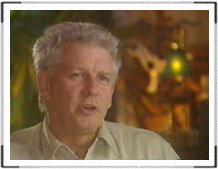
At left: Ronnie on Australian Story (Image source: ABC)
The Burns family hit the news again in a big way later in the year when Ronnie and Maggie's daughter Lauren won the gold medal in Tae Kwon Do at the Sydney 2000 Olympics. (A sad footnote to this story is that Lauren's Melbourne home was burgled and her medals stolen in late 2003). In October 2001, Lauren, Ronnie, Mike and Maggie featured in "Unbreakable", an episode of Australian Story on ABC-TV that looked at Lauren's career. On the same night Ronnie was guest of honour in an episode of the Nine Network's This Is Your Life, which also featured many old friends -- Johnny Young, Darryl Cotton, Russell Morris, Molly Meldrum, Marcie Jones -- and Ronnie's family, including a funny appearance by Mike Burns, who cheekily sent up his dad by miming to Coalman while wearing some of Ronnie's 60s gear, including a rather groovy coat that Ronnie revealed he had bought in London while shopping in Carnaby St with Barry Gibb!
Ronnie's enduring popularity with audiences demonstrates the affection and esteem that he still commands, as an example of those simpler, more innocent times, when a guy with a hip haircut, dimpled cheeks, an appealing voice and a swag of great tunes could reduce teenage girls (and in some cases, boys alike), to delirium. Long live Ronnie Burns, one of our truest pop heroes!
Article by Paul Culnane
DISCOGRAPHY
Singles
The Flies:
Jun. 1964
"I'll Be In Love With You" / "Tell Her That"
(RCA 101586)
Jun. 1965
"Doin' The Mod" / "Ain't That Just Like Me" (RCA 101618)
Sep. 1965
"Can't You Feel?" / "I'll Pass On By" (RCA 101633)
Ronnie Burns solo:
Jun. 1966
"Very Last Day" / "Let It Be Me" (Spin EK 1346)
Aug. 1966
"True True Lovin" / "Too Many People" (Spin EK 1447)
Jan. 1967
"Coalman" / "All The King's Horses" (Spin EK 1578)
Jun. 1967
"Exit Stage Right" / "In The Morning"
(Spin EK 1789)
Aug. 1967
"We Had A Good Thing Going" / "Can't You
Feel?" (Spin EK 1942)
Jan. 1968
"When I Was 6 Years Old" / "So Good Together" (Spin EK 2149)
Dec. 1968
"Age Of Consent" / "Piccadilly Pages" (Spin EK 2627)
Mar. 1969
"Harry The Happy Hooligan" / "How'd We Ever Get This Way?" (Spin EK
2877)
Nov. 1969
"Smiley" / "Jodie" (Spin EK 3380)
Jan. 1971
"The Prophet" / "Maggie Mine" (Spin EK 4112)
Jul. 1971
"1000 Years" / "One Bad Thing" (Festival FK 4337)
Jan. 1972
"If I Die" / "Such A Girl" (Spin EK 4522)
May 1974
"Changes" / "Mix Me Another Drink" (L&Y K5488)
Dec. 1980
"Brand New #1" / "I Want You (and the Class of '66)" (Fable FB 338)
EPs
The Flies:
The Flies featuring Ronnie Burns (RCA
20467)
- no tracklisting available
Ronnie Burns solo
Sep. 1966
This Is Ronnie Burns (Spin EX 11201)
"Very Last Day" / "Too Many People" /
"Let It Be Me" / "True
Love"
Mar. 1967
Coalman
(Spin EX 11314)
"Coalman" / "Tophat" / "All The Kings
Horses" /
"Butterfly"
Jun. 1967
Exit Stage Right
(Spin
EX 11319)
"Exit Stage Right" / "My Little Red
Book" / "In
The Morning" / "You’ve Got To Hide Your Love Away"
Oct. 1967
We Had A Good Thing
Goin’ (Spin EX 11383)
"We Had A Good Thing Goin' " / "Can't
You Feel?" / "Fifi
The Flea" / "Terrible Way You Treat Your Baby"
Apr. 1968
When I Was 6 Years Old (Spin EX 11454)
"When I Was 6 Years Old" / "So Good
Together" / "Can't
Let Her Go" / "Monday Monday"
Dec. 1968
Age Of Consent (Spin EX
11594)
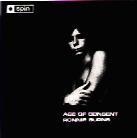
"Age Of Consent" / "Piccadilly Pages" / "How'd We Ever
Get This Way?" / "Harry The Happy Hooligan"
Mar. 1970
Smiley (Spin EX
11693)
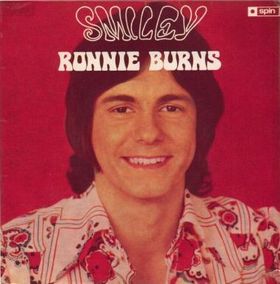
"Smiley" / "My Little Red Book" / "I'll
Know What To Do" /
"Jodie"
Mar. 1971
The Prophet
(Spin EX
11780)
"The Prophet" / "Maggie Mine" / "Mr
Bojangles" / "Fairfax Rug"
Albums
Jul. 1967
Ronnie
(Spin EL 32439)
reissued as Calender R66-550
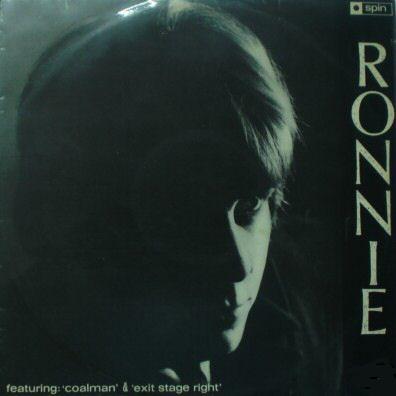
Tracklisting:
"Top Hat"
"My Little Red Book"
"Exit Stage Right"
"I Can't Let Go"
"You've Got to Hide Your Love Away"
"Monday Monday"
"Coalman"
"Butterfly"
"In The Morning"
"All the King's Horses"
"True True Lovin'"
"I'll Know What To Do"
"Fifi The Flea"
"Terrible Way to Treat Your Baby"
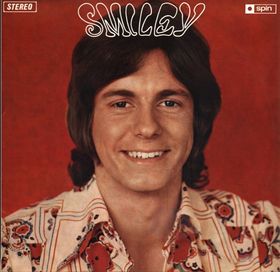
Side
1:
1. "Smiley" (Johnny Young) 3:25
2. "Mr. Bojangles" (Jerry Jeff Walker) 4:15
3. "Rainmaker" (Martin – Nilsson) 2:50
4. "Cold in My Nose" (Barron Knights) 3:10
5. "Sunshine" (R. Jessel) 2:10
6. Medley: "Good Golly, Miss Molly" (Blackwell – Marascalco)
/ "Devil With a Blue Dress On" (Long – Stevenson) 3:21
Side 2:
1. "Age of Consent" (Terry Britten) 2:35
2. "A Love Song" (Johnny Young) 2:47
3. "Fairfax Rag" (Martin) 2:19
4. "Such a Girl" (Tusa – Vetch) 2:00
5. "Picadilly Pages" (Tusa – Vetch) 2:45
6. "Jodie" (Johnny Young) 4:09
1971
The Best Of Ronnie Burns (Spin SEL 934359)
reuissued as Calendar SR 66 9918 and Festival
FL 34359
"Age of Consent" (Terry Britten)
"All The King's Horses" (Barry Gibb)
"Coalman" (Barry Gibb)
"Exit Stage Right" (R, B & M
Gibb)
"If I Die" (Johnny Young)
"In The Morning" (Barry Gibb)
"Monday Monday' (John Phillips)
"Mr Bojangles" (Jerry Jeff Walker)
"The Prophet" (Johnny Young)
"Smiley" (Johnny Young)
"Very Last Day" (Paul Stookey – Peter
Yarrow)
"When I Was 6 Years Old" (Brian Cadd –
Max Ross)
Aug. 1971
Virgo
(Spin SEL 934060)
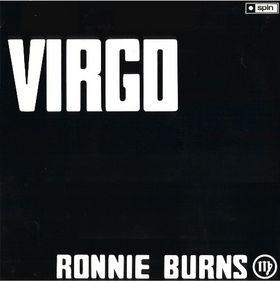
Side 1:
1. "The Prophet" (Johnny Young)
2. "Jesus" (Johnny Young)
3. "Are You Ready" (Johnny Young)
4. "Maggie Mine" (Johnny
Young–Ronnie Burns)
5. "Virgin" (Johnny Young –
John Farrar)
Side 2:
1. "If I Die" (Johnny Young)
2. "Tomorrow and the Next Day" (Johnny
Young)
3. "War is Over" (Johnny Young)
4. "Please be My Friend" (Johnny Young)
5. "Easy Rider" (Johnny Young)
Dec. 1972
We've Only Just Begun
(Festival FL 34682)
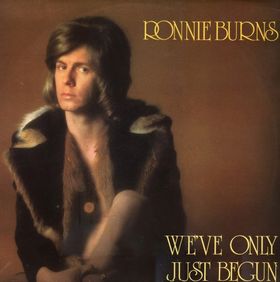
Side 1:
1. "We've Only Just Begun" (P Williams –
R Nichols)
2.
"It's Too Late" (C King – T
Stern)
3. "Never Can Say Goodbye" (Clifton
Davis)
4. "One Bad Thing" (Barry Gibb)
5. "Here Comes The Sun" (George Harrison)
6. "Midnight Sunshine" (Dave Antrell)
Side 2:
1. "If You Could Read My Mind" (Gordon
Lightfoot)
2. "A Thousand Years" (Rick Springfield)
3. "Happiness" (Randazzo –
Pike)
4. "And The Grass Won't Pay No Mind" (Neil
Diamond)
5. "I Could Be Happy With You" (S.Wilson) - duet with Debbie Byrne
1974
For You
[Summit SRA 250087]
(budget compilation; release date unknown – tracklisting
largely similar to other compilations available]
1977
Listen to the Band (J&B
Records JBP 7709) - with the The Kinderplay Rockettes
1994
Enter Stage Left: The Festival File Vol. 23
[Festival CD]
"A Love Song" (Johnny Young)
"Age of Consent" (Terry Britten)
"All The King's Horses" (Barry Gibb)
"Can’t You Feel?" (J Thomas
– R Burns)
"Coalman" (Barry Gibb)
"Exit Stage Right" (R, B & M
Gibb)
"Harry The Happy Hooligan" (Terry
Britten)
"How’d We Ever Get This Way?" (J
Barry – A Kim)
"I Can’t Let Go" (C Taylor
– A Georgoni)
"If I Die" (Johnny Young)
"In The Morning" (Barry Gibb)
"Jodie" (Johnny Young)
"Maggie Mine" (Johnny Young – Ronnie
Burns)
"Mr Bojangles" (Jerry Jeff Walker)
"Piccadilly Pages" (Tusa –
Vetch)
"The Prophet" (Johnny Young)
"Smiley" (Johnny Young)
"So Good Together" (Brian Cadd – Max
Ross)
"Such A Girl" (Tusa –
Vetch)
"Sunshine" (R Jessel)
"Terrible Way To Treat Your Baby" (R, B
& M
Gibb)
"Too Many People" (L Ransford)
"Tophat" (Barry Gibb)
"True Lovin’" (Welsh)
"Very Last Day" (Paul Stookey – Peter
Yarrow)
"We Had A Good Thing Going" (Sedaka –
Greenfield)
"When I Was 6 Years Old" (Brian Cadd –
Max Ross)
REFERENCES / LINKS
Thanks to Mark Crohan for additional information.
ABC: Australian Story
"Unbreakable" (11 October 2001)
http://www.abc.net.au/austory/archives/AustoryArchivesIdx_Thursday11October2001.htm
Joseph Brennan
Gibb Songs website
Ian McFarlane
Encyclopedia of
Australian Rock & Pop (Allen &
Unwin 1999)
Noel McGrath
Australian Encyclopedia
of Rock (Outback Press, 1978)
poparchives.com.au - Go-Set
charts
http://www.poparchives.com.au/gosetcharts/index.html